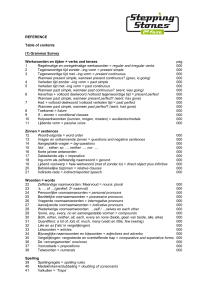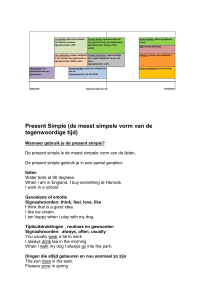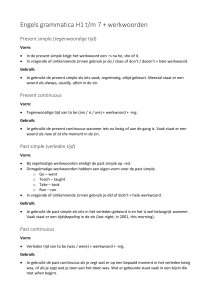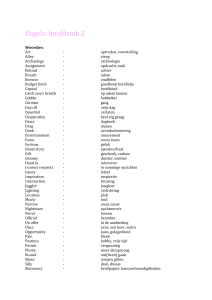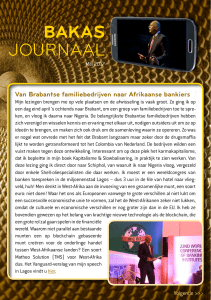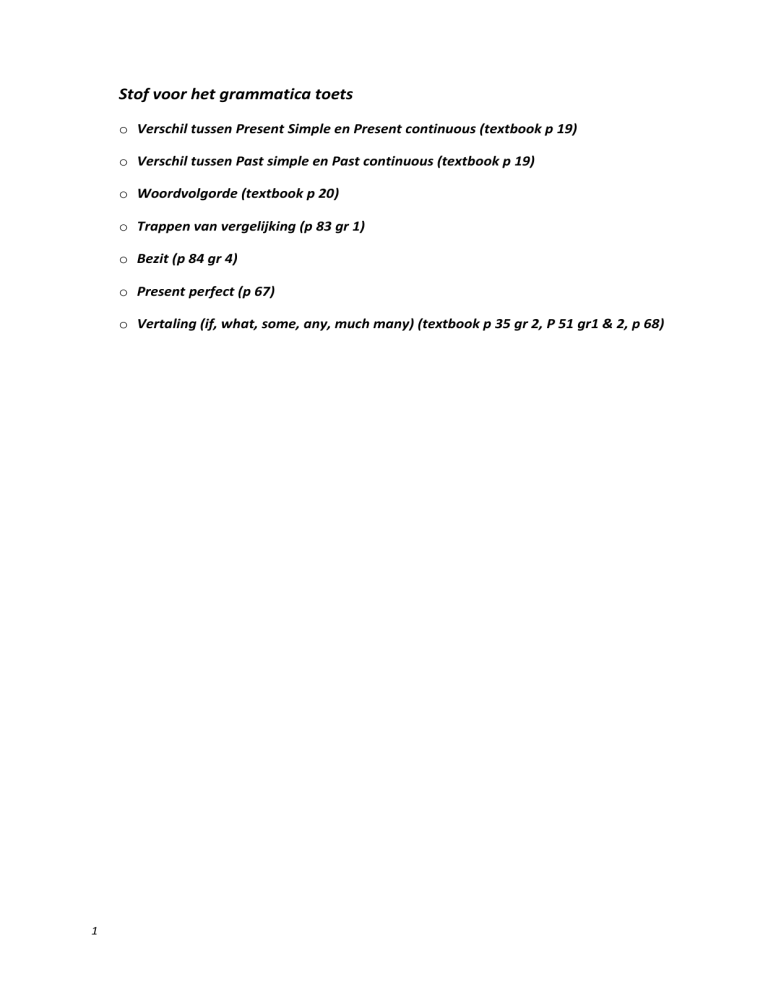
Stof voor het grammatica toets
o Verschil tussen Present Simple en Present continuous (textbook p 19)
o Verschil tussen Past simple en Past continuous (textbook p 19)
o Woordvolgorde (textbook p 20)
o Trappen van vergelijking (p 83 gr 1)
o Bezit (p 84 gr 4)
o Present perfect (p 67)
o Vertaling (if, what, some, any, much many) (textbook p 35 gr 2, P 51 gr1 & 2, p 68)
1
A. Verschil tussen Present Simple en Present continuous
Present simple = dingen die jij op regelmatige basis doet (Bijvoorbeeld elke dag, elke
week, een keer in twee weken, vaak, altijd…)
Present continuous: dingen die NU aan het doen bent of als een uitzondering * van
boven gemelde regelmaat.
Voorbeelden: I often work at school. (present simple)
She often works at school. (present simple)
I am working at school at the moment.(present continuous)
She is working at school at the moment.
We are working at school at the moment.
*Of : She always goes to Turkey for holiday but this year she is going to
England.
Oefening:
A1. Fill in the verbs in the Simple Present or the Present Progressive (continuous).
1) John often_______________sugar in his coffee. (to take)
2) I usually_______________as a teacher in Germany, but this summer
I_______________as a language assistant in Rome. (to work)
3) Right now Christine_______________on the computer. (to work)
4) The flowers_______________beautiful. (to smell)
5) Listen! They_______________home. (to come)
2
B. Verschil tussen Past simple en Past continuous
Past Simple: verleden tijd, het is afgelopen
Past Continous: In het verleden aan het doen was. Vaak zie je deze tijd met WHEN en
WHILE.
Voorbeelden: I worked a lot last year. (past simple) normaal gesproken zet je –ED
achter het werkwoord behalve bij onregelmatige werkwoorden. Voor onregelmatige
werkwoorden kies je de tweede vorm.
I was working yesterday when my father rang. (ik was aan het werken toen
iets gebeurde.)
They were working yesterday when thier father rang.
Oefening:
B1. Fill in the verbs in the Past Simple or the Past continuous.
1. When I___________________you about Ryan's new flat you___________________.
(tell; not listen)
2. A: When I___________________you yesterday morning you___________________in
your office. (call; not be) Where___________________? (you be)
B: I ________________ lunch with my boss. (have)
3. A: What___________________when the accident happened? (you do)
B: I _______________________ a broken window. (fix)
3
C. Woordvolgorde
Wie doet wat/ wie waar wanneer
Voorbeeld: I gave Mary some flowers at work on Monday.
Hier is het belangrijk; tijd helemaal achteraan (of juist helemaal vooraan)
Hier is het ook belangrijk waar woorden zoals ALWAYS, USUALLY, NEVER, EVER, OFTEN,
…etc moeten komen.
Oefeningen:
C1. Zet de woorden in de juiste volgorde en maak zo goede Engelse zinnen. Schrijf
daarna de hele zin op.
1
Denise – plays – the guitar – always.
2
My grandmother – happy – is – very – always – when I come.
3
We – food – often – Italian – on Sundays – eat.
4
I – music – never – to – classical – listen.
5
My parents – angry – with me – sometimes – are.
C2. Maak goede zinnen door alle zinsdelen in de juiste volgorde te zetten.
4
1
the first roller coaster – in Russia – was built – in the 15th century
2
in 1916 – in Kettering – the first British theme park – opened
3
was built – the highest roller coaster (110 meters) – in 2000 – in the USA
4
Madrid – opened – in 2002 – the world’s biggest theme park
D. Trappen van vergelijking
Zie hs 5 en de werkblad die je gekregen hebt.
E. Bezit
Zie hs 5 en de werkblad die je gekregen hebt
5
F. Present perfect
Wij gebruiken deze als iets in het verleden is begonnen en het geldt nog steeds.
Has/ have + werkwoord met ED (has/have worked) bij regelmatige werkwoorden
Has/have + derde vorm van het werkwoord (has/have seen) bij onregelmatige
werkwoorden
Voorbeeld: I have worked for a long time. (hier have omdat het person I is. En worked
omdat het regelmatige werkwoord is)
She has worked for a long time. (hier has omdat het persoon she is. )
I have been a good student since 2010.
She has been a good student since 2010.
Oefeningen:
F1. Geef antwoord op de vragen. Gebruik in je antwoord de woorden die tussen
haakjes staan.
Voorbeeld:
Why are you so happy? (I – hear – some very good news)
I’m happy, because I’ve heard some very good news.
1
Why is John so angry? (his brother – break – his CD player).
2
Why are you late? (we – forget – the time).
3
Why are they so tired? (work – very hard)
4
Why is your teacher so worried? (lose – all the test papers)
5
Why isn’t Kathy going to school today? (have – an accident)
G. Vertaling (if, what, some, any, much many)
Kijk naar: (textbook p 35 gr 2, P 51 gr1 & 2, p 68)
6
Voorbeeld:
studying.
Als ik jou was, zou ik gaan leren. If I were you, I would start
Waar kijkt hij naar? What is he looking at?
Zijn er eieren in de koelkast Are the any eggs in the refrigerator?
Er zijn eieren in de koelkast There are some eggs in the refrigerator.
Heb jij veel geld? Do you have much money?
Heb jij veel vrienden? Do you have many friends?
ANTWOORDEN:
A) Fill in the verbs in the Simple Present or the Present Progressive.
1) John often takes sugar in his coffee.
2) I usually work as a teacher in Germany, but this summer I am working as a language assistant in Rome.
3) Right now Christine is working on the computer.
4) The flowers smell beautiful.
5) Listen! They are coming home.
B1. Fill in the verbs in the Past Simple or the Past continuous.
When I told you about Ryan's new flat you were not listening.
A: When I called you yesterday morning you were not in your office. Where were you
B: I was having lunch with my boss.
3. A: What were you doing when the accident happened?
B: I was fixing a broken window.
1.
2.
C1. Zet de woorden in de juiste volgorde en maak zo goede Engelse zinnen. Schrijf
daarna de hele zin op.
1
2
3
4
5
Denise always plays the guitar.
My grandmother is always very happy when I come.
We often eat Italian food on Sundays.
I never listen to classical music.
My parents are sometimes angry with me.
C2. Maak goede zinnen door alle zinsdelen in de juiste volgorde te zetten.
1
1
2
7
The first Rollercoaster was built in Russia in the 15th century.
The first British theme park opened in Kettering in 1916.
The highest roller coaster (110 meters) was built in the USA in 2000.
3
The world’s biggest theme park opened in Madrid in 2002
F1. Geef antwoord op de vragen. Gebruik in je antwoord de woorden die tussen
haakjes staan.
1 John is angry, because his brother has broken his CD player.
2 We are late, because we forgot the time.
3 They are tired, because they have worked very hard.
4 Our teacher is worried, because she has lost all the test papers.
5 Kathy isn’t going to school today because she has had an accident.
8

